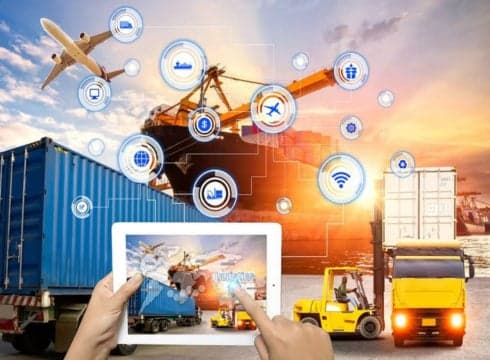Blockchain has the potential to address complications in the logistics sector
AI is enabling logistics players to automate their supply chain
AR technology is also making last-mile delivery more futuristic
Inc42 Daily Brief
Stay Ahead With Daily News & Analysis on India’s Tech & Startup Economy
The wave of technological innovation is sweeping the world off its feet. It is impacting every other industry we know and transforming it at an unprecedented rate. The emergence of this high-performance technology is creating strong ripples even the logistics sector in India. On the one hand, it is reducing the friction in the world of logistics, while on the other side it is making it a more efficient and automated process.
Considering the impact on a nation, the logistics sector in India has a significant role in the country’s functioning. Without it, everything from the market to the economy will come to a virtual halt. And with the intensity that the technological innovations are penetrating the logistics sector in India, there’s no going back from here.
Let’s take a look at some of the most significant tech trends that are currently disrupting the logistics sector of India:
Blockchain in Logistics
Documentation and information verification continues to remain the Gordian knot of the global logistics industry. The biggest challenges are faced perhaps in areas such as procurement, transportation management, order tracking, and customs collaboration. Blockchain – the revolutionary technology that made cryptocurrencies a global phenomenon – has the potential to address this complication with considerable ease.
For the uninitiated, blockchain is a reliable system comprising a series of blocks that record transactional information. Any information addition or modification in the previous dataset can only be done by adding another block to the Merkle tree. It is then verified and synchronized by all of the interacting parties – with all having access to the distributed ledger. The approach eliminates the scope of data falsification as the stakeholders can quickly identify it.
This characteristic of blockchain technology is enabling us to counter the areas of friction in logistics seamlessly. The technology is also optimizing the cost and time in logistics operation including ocean freight shipments and is experiencing widespread adoption in the logistics sector in India.
AI and ML for supply chain optimization
Artificial Intelligence has lately become the buzzword for nearly all industries. The trailblazing technology hasn’t left the logistics sector untouched. It is enabling logistics players to automate their supply chain and collate first-hand insights that otherwise remain hidden in the constantly generating data.
Such insights can be related to tracking, backend operations, inbound and outbound functions, and so on. But what difference do these insights and technology make? They fundamentally enhance the visibility of operations, decrease the turnaround time, increase throughput, and eliminate bottlenecks by automating and streamlining processes.
This significantly boosts operational efficiency, eliminate SLA breaches, and makes the customer experience more pleasant.
Low-to-No Asset Networks
In its journey from the origin (supplier) to the final destination (end-customer), a product is handled by around 7 to 11 intermediaries. This includes transporters, warehouses, and last-mile operators alongside others. Establishing a partnership with all of them is not possible for an individual supplier within the logistics sector in India.
Even if done, managing all distinct processes and their integration to the broader logistics operation becomes quite labyrinthine to manage. This is precisely why tech-driven shipping aggregators are now entering the domain. Using their proprietary solution, they enable all stakeholders (suppliers, shipping players, etc.) to make the most out of their business models.
Their tech-driven approach allows suppliers to cater to their buyers cost-effective and time-efficiently. This also increases the visibility of scattered supplies originating from a region and helps in bundling them, so that businesses irrespective of their transactional volumes realize avant-garde infrastructure and cheaper tariffs.
IoT for tracking
Today, shipment tracking (of a separate product and the entire consignment) can be done in real-time with the use of RFID tags, GPS, and specialized sensors. This helps in pre-emptive detection of potential SLA breaches and enables logistics players to fast-track their shipment to avoid the same.
Other supply-chain-related bottlenecks can also be removed with the use of specific approaches such as geo-fencing, geo-tagging, and proximity alert. For instance, the forward supply chain can be readied when a shipment is approaching the warehouse, thereby reducing times in stopovers. This decreases delays in transfers and boosts operational efficiency for logistics sector in India.
Augmented Reality
High-value shipments naturally come with security threats such as hijacking which need to be addressed. This is an area where Augmented Reality (along with facial recognition technology) is driving positive results by securing deliveries.
The technology is also making last-mile delivery more futuristic with building recognition and indoor navigation. It, moreover, is helping in warehouse planning for improved in-house logistics.
Autonomous transport
Though it might sound like a sci-fi movie, e-vehicles such as self-driving trucks, ghost cargo ships (autonomous ships), and drones are gradually becoming a modern reality.
These technological interventions have already materialized in the western markets and wouldn’t take long to surface in India as well. It is projected that autonomous transport solutions can save as much as 20% of the fuel costs by supporting transportation, warehousing operations, and last-mile deliveries.
India has already approved a regulation for drones, and related frameworks for other use cases are in the pipeline. The launch of 5G services by 2020 is also anticipated by the industry and will pave the way for logistics 4.0 in India.
Indian economy is swiftly coming to the global centre stage and is gearing up to stand shoulder-to-shoulder with its western counterparts. With greater technological influx, it is just a matter of years until this happens. We have to wait until this becomes a day-to-day reality for us.
{{#name}}{{name}}{{/name}}{{^name}}-{{/name}}
{{#description}}{{description}}...{{/description}}{{^description}}-{{/description}}
Note: We at Inc42 take our ethics very seriously. More information about it can be found here.


